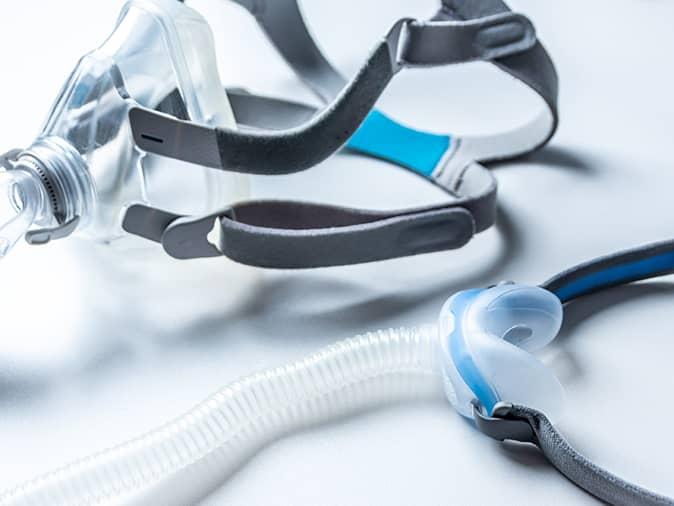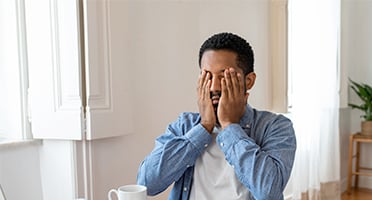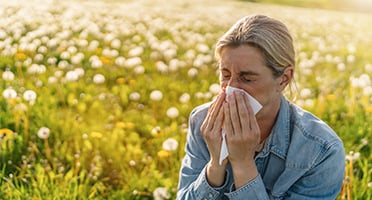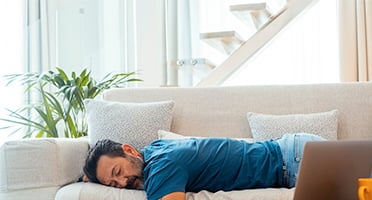For many, fears about sleep apnea treatment are scarier than the possibility of having sleep apnea. It may seem attractive and easy to blissfully ignore the likelihood of sleep apnea, even when experiencing daytime sleepiness, morning headaches, and cognitive decline. But it’s crucial to get a sleep study if you suspect you may have sleep apnea.
Without treatment, your condition will only worsen, and the symptoms you feel will compound until they’re unbearable or you become so tired that you cause an accident while driving. Sleep apnea takes over your life and is detrimental to your wellness, and can cause serious relationship problems if left untreated. These are just a few of the consequences of untreated sleep apnea.
It’s best for you and those around you to get tested for sleep apnea and find a treatment option that works for your type of sleep apnea, severity, and lifestyle.

Top Treatment Fears that Keep Apneacs Awake
Fear 1: My partner and I won’t be able to sleep with a CPAP
This is a common fear that isn’t unfounded. Some people indeed find CPAP hard to tolerate. However, CPAP isn’t necessarily your only treatment option.
But if your doctor recommends CPAP as the best treatment, know that there are different types of CPAP machines that can make sleeping for you and your partner easier. Do some research to find the best style of mask and machine size for you.
Fear 2: I won’t be able to go camping anymore
You can go camping with sleep apnea. One of the major fears is that sleep apnea treatment will be more disruptive to your life than the condition. This is simply untrue. In the case of camping, you can get a battery-operated CPAP machine. They’re smaller, lighter, and don’t need an outlet. If you’re a little more hard-core than camping, know that you can also backpack with your sleep apnea treatment. Many people opt to use an oral appliance in the backcountry because it’s light and requires no power.
Fear 3: I get claustrophobic and can’t use a CPAP
CPAP can be difficult for people with claustrophobia. However, there are different types of masks that you can try to ease your discomfort. And if CPAP simply will not work for you, you can always try a different treatment, such as oral appliance therapy or Inspire.
Fear 4: I travel for work and can’t bring the treatment anyway
“I won’t/can’t use a sleep apnea treatment anyway” is an excuse not to get tested for sleep apnea. Do you travel a lot for work and are nervous about bringing your treatment with you? Just like CPAP options for camping, there are options for travel. You can get a smaller CPAP that fits in your carry-on bag. Or, you can opt for a different treatment type.
Types of Sleep Apnea Treatment
Did you know there are different types of sleep apnea treatment? While CPAP is an option, it’s not the only option. Here is a guide on the different types of sleep apnea treatment and when you can use them.
CPAP
You’ve likely heard of CPAP, and the images in your head of a loud machine and mask might be the thing keeping you from getting a sleep study. But fear not, modern CPAP machines are not like the ones you’re picturing. CPAP machines have come a long way; you can get different types depending on your needs.
CPAP is best for…
A CPAP machine treats central sleep apnea, obstructive sleep apnea, and complex sleep apnea. It can also treat anyone regardless of how severe your condition is. Because of its versatility, it’s been the gold standard for a long time.
CPAP works by…
CPAP is a small machine that pushes air through your airway, keeping it open and stimulating your lungs to breathe. You’ll wear a mask over your nose and/or mouth and sleep all night soundly.
Oral Appliance Therapy
You may not have heard of oral appliance therapy. It’s been around for many years, but insurance usually recommends CPAP as a first-line defense. But if you can use it, you’ll treat your sleep apnea without CPAP.
Oral appliance therapy (OAT) is best for…
OAT is for those with mild to moderate obstructive sleep apnea or for those who can not tolerate a CPAP machine.
Oral appliance therapy works by…
Your oral appliance is a small, sleek orthotic worn in your mouth while sleeping. It looks like a mouthguard, but it’s so much more than that. It is specially designed to fit your mouth, teeth, and jaw. It moves your jaw slightly forward to make more room in your airway for your collapsing tissues. That way, you have enough room for oxygen to get through all night. You’ll wake up symptom-free every day.
Inspire Implantation Surgery `
Inspire is a relatively new sleep apnea surgery.
Inspire is best for…
Inspire is best for people over 18 years old with moderate to severe obstructive sleep apnea and who can’t tolerate a CPAP machine.
Inspire works by…
Inspire is an implanted device that stimulates your tongue to move out of the way as you breathe. You’ll need to undergo outpatient surgery to get Inspire. You’ll turn the device on each time you sleep with a remote. The device detects your breathing and sends a small electrical impulse to your tongue muscle, causing it to stick out, allowing room for oxygen. With successful surgery, your sleep apnea symptoms will resolve.
Other Surgery
There are other sleep apnea surgery options, but many doctors don’t recommend surgery as the best treatment for sleep apnea due to low success rates.
Test Your Sleep Today with an At-Home Sleep Test
Don’t let fear keep you from getting the sleep apnea treatment you need. You can get an easy-to-use, convenient home sleep test from Sleeptest.com. You can pay with insurance or out of pocket, and we’ll ship the sleep test right to your house. After your two-night test, send it back with our paid postage, and you’ll have the results of your sleep study within days. Next, we’ll connect you with a sleep doctor who can recommend treatment options and help you pick the best treatment for your sleep apnea and lifestyle.

Feeling tired all the time, even after a full night’s sleep? You might be suffering from sleep apnea. Discover how an at-home sleep test can help diagnose the root cause of your fatigue—and get you back to feeling like yourself.

Spring is here—and so is the pollen. For the millions dealing with seasonal allergies, the symptoms can be more than just annoying. And if you also have sleep apnea, those stuffy nights and restless sleep can get even worse.
Let’s take a closer look at how spring allergies and sleep apnea affect each other—and what steps you can take to sleep more comfortably.




